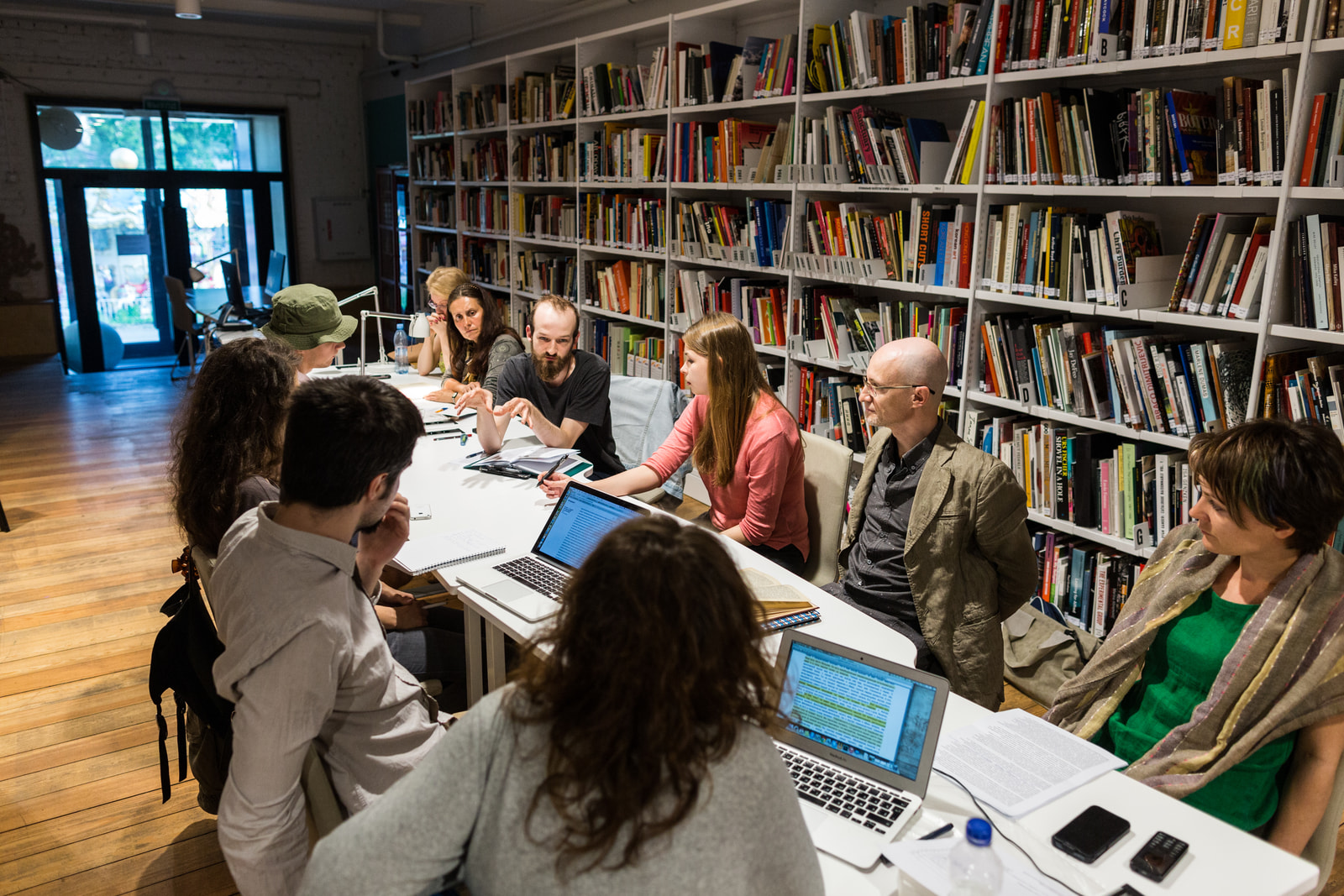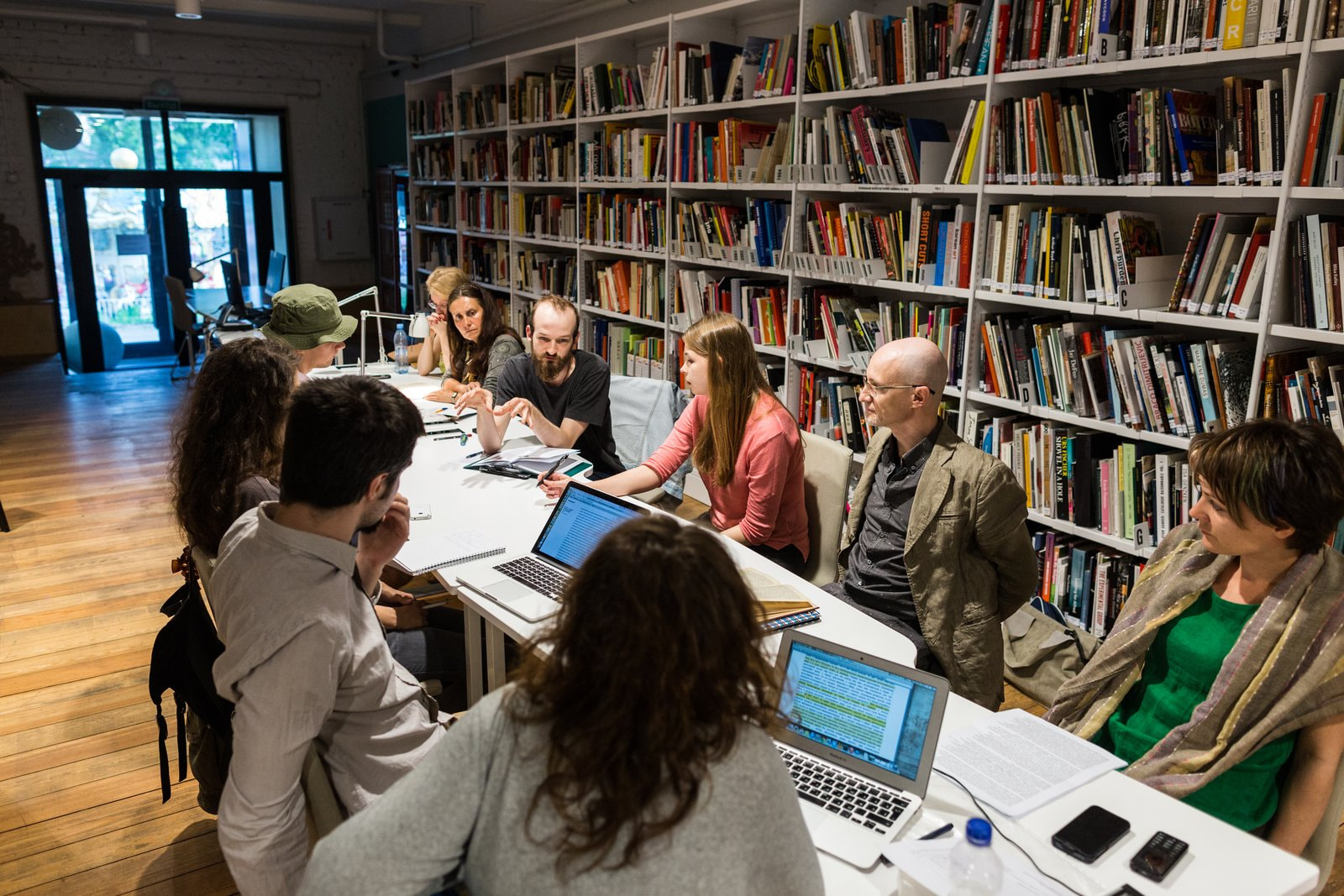Garage Library continues its series of Reading Groups, introducing readers to publications on Russian and international contemporary art. Participants can become acquainted with Garage Library, read selected texts, and join in group discussions.
The series of Reading Groups launched this past spring became platforms for discussion on theoretical approaches to art in the 20th century, feminist studies, and Marxism.
In addition to examining new texts on these same themes, new Reading Groups will also be introduced. Discussions this fall will focus on phenomenology, representations of gender in art, feminist art in the post-Soviet era, and sociological approaches to contemporary art.
READING GROUP 1: MAJOR THEORETICAL APPROACHES TO THE ART OF THE 20TH CENTURY
This season Reading Groups will read about and discuss the main concepts of two philosophical trends: phenomenology and Marxism. Their radical differences will illustrates in new ways the differences between the arts, including literature and music.
Mondays, September 28, October 12, 19, 26, and November 2, 19:00–21:00, Garage Education Center, Garage Library
Phenomenology
Roman Ingarden, “Two-dimensional Formation of the Literary Work,” R. Ingarden, Research on Aesthetic, Moscow: The Foreign Languages Publishing House, 1962: 21–39.
Edmund Husserl, “Phenomenology,” Logos. 1991. No. 1: 12–21.
Maurice Merleau-Ponty, “The body as an Expression and Speech, ” M. Merleau-Ponty, Phenomenology of Perception, Saint Petersburg: Uventa; Nauka, 1999: 229–260.
Edmund Husserl, “The Analysis of Time Consciousness,” E. Husserl, Phenomenology of Internal Time Consciousness, Moscow: Gnozis, Logos, 1994: 23–107.
Mondays, November 9, 16, 23 and 30, December 7 and 14, 19.00–21:00, Garage Education Center, Garage Library
Marxism
Leon Trotsky, “The Formalist School of Poetry and Marxism,” L. Trotsky, Literature and Revolution, Moscow: Politizdat, 1991: 130–145.
Georg Lukács,”The Novel as a Bourgeouis Epic,” Literary encyclopedia, V. 9. Moscow: 1935: 795–832.
Theodor W. Adorno, T. Adorno, Selected works: a sociology of music, Moscow, Saint Petersburg: University book, 1999: 170 – 187.
Ernst Bloch, ”The principle of hope,” Ernst Bloch, Utopia and Utopian Thought, Ed. V. Tchalikova, Moscow: Progress, 1991: 49 – 78.
Moderator: Vladislav Sofronov, Ph.D. , independent researcher, author of Communist Sensuality: Reading Kierkegaard, Proust, Kafka, Marx (Moscow, 2009), and translator of Slavoj Žižek’s Sublime Object of Ideology and Arthur Lovejoy’s Great Chain of Being, as well as a member of the editorial boards of Logos, Art Magazine, and others.
READING GROUP 2: MARXISM AND CONTEMPORARY CULTURE
Members of this Reading Group will read key texts related to the Marxist tradition, providing an understanding of themes and issues relevant to both the past and present day.
Tuesdays, September 29, October 13 and 20, 19:00–21.00, Garage Education Center, Area 2
Social classes in society and the struggle between classes as a classical theme of Marxism
Vladimir Lenin, “A Great Beginning,” V. Lenin, Selected Works, 10 v. V. 4. Moscow: Politizdat, 1985: 1–22.
Vladimir Lenin, “Karl Marx (A brief biographical sketch with an exposition of Marxism),” V. Lenin, Collected Works. 5th edition. V. 26. Moscow: State Printers of Political Literature, 1969: 43 – 93.
Vladimir Lenin, “Three Sources and Three Elements of Marxism,” V. Lenin, Collected Works. 5th edition. V. 23. Moscow: State Printers of Political Literature, 1969: 236–241.
Vladimir Lenin, “The Proletarian Revolution and The Renegade Kautsky,” V. Lenin, Collected Works. 5th edition. V. 37. Moscow: State Printers of Political Literature, 1969: 237–338.
Tuesdays, October 27, November 10, and 17, 19:00–21:00, Garage Education Center, Area 2
The State and its structures
Vladimir Lenin, “The State and Revolution. The Marxist Theory of the State & the Tasks of the Proletariat in the Revolution,” Moscow: State Printers of Political Literature, 1983: 5–22.
Vladimir Lenin, “The State: A Lecture Delivered at the Sverdlov University,” July 11, 1919, V. Lenin. Collected Works. 5th edition. Moscow: State Printers of Political Literature, 1969: 65–84.
Tuesdays, November 24, December 1, 8, and 15, 19:00–21:00, Garage Education Center, Area 2
Culture as the Mirror of Society?
Karl Marx, “The Eighteenth Brumaire of Louis Bonapart,” K. Marx, F. Engels, Selected Works, 2nd ed., V. 8. Moscow: Politizdat, 1957: 115–217.
Vladimir Lenin, “Leo Tolstoy as the Mirror of the Russian Revolution,” V. Lenin, Articles on Tolskoy, Moscow: OGIZ, 1949: 3–8.
Leon Trotsky, “The Formalist School of Poetry and Marxism,” L. Trotsky, Literature and Revolution, Moscow: Politizdat, 1991: 130-145.
Moderator: Vladislav Sofronov, Ph.D. , independent researcher, author of Communist Sensuality: Reading Kierkegaard, Proust, Kafka, Marx (Moscow, 2009), and translator of Slavoj Žižek’s Sublime Object of Ideology and Arthur Lovejoy’s Great Chain of Being, as well as a member of the editorial boards of Logos, Art Magazine, and others.
READING GROUP 3: FEMINISM AND CONTEMPORARY ART
This Reading Group will analyze texts on the basics of feminist critical theory and the politics of rethinking art history from a feminist point of view. Texts on feminist art in the post-Soviet era will also be read.
Fridays, October 2, 9, and 16, 19:00–21:00, Garage Education Center, Areas 2, 4
The Feminist Revision of Art History
Whitney Chadwick, “Art History and Woman Artist,” Chadwick W. Women, Art and Society, London: Thames & Hudson, 2012, 5th ed.: 17–42.
Rozsika Parker and Griselda Pollock, “Crafty Women and the Hierarchy of Arts,” R. Parker, G. Pollock, Old Mistresses, London: I.B.Tauris, 2013: 50–81.
Fridays, October 30, November 6, and 13, 19:00–21:00, Garage Education Center, Areas 2, 4
Theoretical and philosophical basics of the Feminist Theory
Simone de Beauvoir, “Woman’s Situation and Character,” S. Beauvoir, Second Sex, Moscow, St. Petersburg: AO Progress Publishing group, 1997: 674–706.
Shulamith Firestone, “Freudianism: The Misguided Feminism,” S. Firestone, The Dialectic of Sex: the Case for Feminist Revolution, New York: Bantam Book, 1970: 41–71.
Irina Zherebkina, The Theory of Feminism. Section I “Feminist literary criticism as a model to develop the theory of female subjectivity in women,” 2.
Luce Irigaray, “Genealogy of a Woman,” I. Zherebkina, “Read my desire…,” Postmodernism. Psychoanalysis. Feminism, Moscow: Idea-Press, 2000: 134–168.
Fridays, November 20 and 27, 19:00–21:00, Garage Education Center, Areas 2, 4
Critics of visual representation of gender images in arts
Laura Mulvey, “Visual Pleasure and Narrative Cinema,” Laura Mulvey, The Feminism and Visual Culture Reader, Ed. Amelia Jones, New York: Routledge, 2010: 57–65.
Alexey Levinson, “Woman as a goal and the means in Russian ads,” Alexey Levinson, The woman and Visual Signs, ed. A.M. Alchuk, Moscow: Idea-Press, 2000: 44–64.
Fridays, December 4, 11, and 18, 19:00–21:00, Garage Education Center, Areas 2, 4
Female and feminist art in the post-Soviet era
Renee and Matthew Baigell, “Introduction and Brief Chronology,” R. and M. Baigell, Peeling Potatoes, Painting Pictures. Women Artists in Post-Soviet Russia, Estonia, and Latvia, The First Decade, New Brunswick: Rutgers University Press, 2001: 1–21.
Oxana Sarkisian, “Gender at the Russian Art Scene,” Zen d’Art, Gender History of Art in the post-Soviet space, 1989–2009, ed. N. Kamenetskaya, O. Sarkisian, Exhibition Catalogue, Moscow, Moscow Museum of Modern Art, 2010: 77–86.
Moderator: Mika Ela, artist, feminist activist, and organizer of The Kitchen female art workshops
READING GROUP 4: SOCIOLOGY AND CONTEMPORARY ART
The program of this Reading Groups consists of texts which look at contemporary art from a sociological point of view. Readers will discuss the concepts of Becker's "Art Worlds" and the field of cultural production of Pierre Bourdieu. These concepts became the foundation for further research into the role of the state and its politics in the field of culture, as well as the role of the artist in the labor market.
Mondays, September 28, October 5 and 12, 19:00–21:00, Garage Education Center, Area 2
Contemporary Art in the focus of sociology, aesthetic and art history.
David Iglis, “Thinking “Art” Sociologically,” The Sociology of Art, Ways of Seeing, ed. D. Iglis, J. Hughson, London: Palgrave Macmillan, 2005: 11–29.
Monday, October 19 and 26, 19:00–21:00, Garage Education Center, Area 2
Howard Becker’s Art Worlds
Howard Becker, “Art as Collective Action,” American Sociological Review, v. 39, no. 6, 1974: 767–776.
Howard Becker, “Art Worlds and Social Types,” American Behavioral Scientist, V. 19, no. 6 (Jul.-Aug. 1976): 703–718.
Richard Lachmann, “Graffiti as Career and Ideology,” American Journal of Sociology, V. 94, no. 2 (Sep. 1988): 229–250.
Monday, November 2 and 9, 19:00–21:00, Garage Education Center, Area 2
The Field of Cultural Production of Pierre Bourdieu
Pierre Bourdieu, “The Production of Belief: Contribution to an Economy of Symbolic Goods,” 1977, Pierre Bourdieu, The Field of Cultural Production, Cambridge: Polity Press, 1993: 74–111.
Nuria Peist, “The Heir and the Cowboy: Social Predisposition, Mediation and Artistic Profession in Marcel Duchamp and Jackson Pollock,” Cultural Sociology, 2012, V. 6, No. 2: 233–250.
Mondays, November 16 and 23, 19:00–21:00, Garage Education Center, Area 2
The State and Contemporary Art
Victoria D. Alexander and Marylin Rueschemeyer, “Art and the State. The Visual Arts in Comparative Perspective,” London: Palgrave Macmillan, 2005.
Mondays, November 30, December 7 and 14, 19.00 – 21.00, Garage Education Center, Areas 2, 4
Artists in the Labor Market
Pierre-Michel Menger, “Artistic Labor Markets: Contingent Work, Excess Supply and Occupational Risk Management, Handbook of the Economics of Art and Culture,” V. 1, ed. V.A. Ginsburgh, D. Throsby, Amsterdam: North Holland, 2006: 766–809.
Moderator: Evgenia Abramova, art worker, researcher of art workers’ labor conditions and art studios. A participant in the collective research projects Warsaw/Moscow: Alterations in Progress. The Vicissitudes of Monuments in the Post-socialist Public Sphere (2014), and The May Congress of Art Workers and Unemployed (2010–2012), among others. She has contributed to publications including the Philosophy Journal, The New Literary Review, Colta.ru, Polit.ru, ArtLeaks, and ArtGuide.

